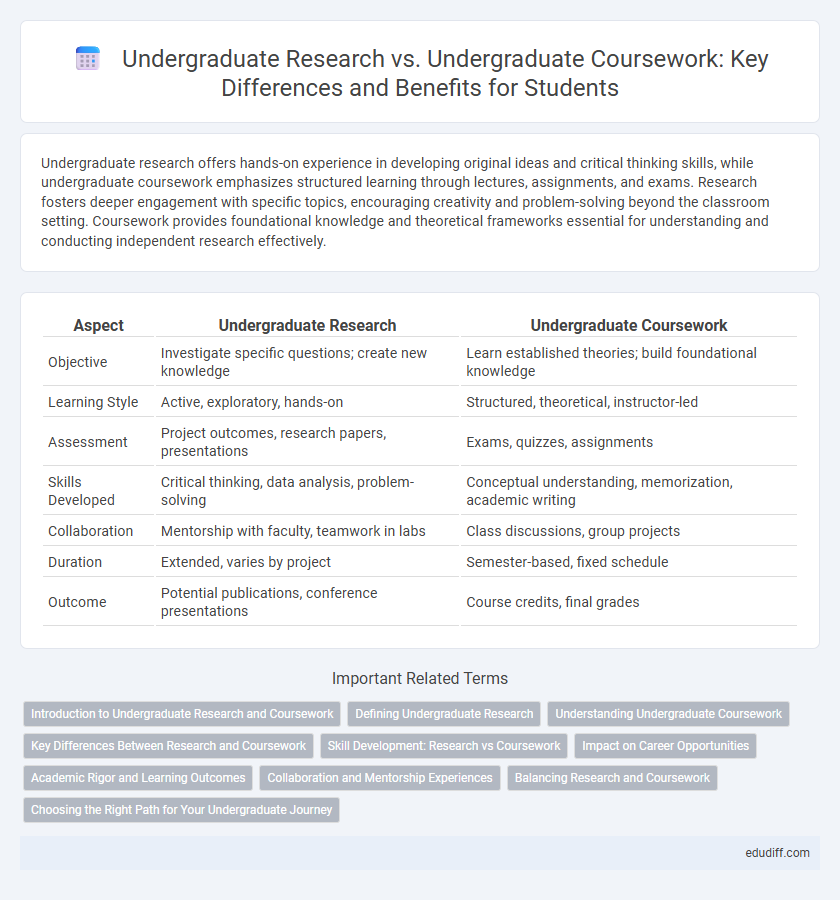Undergraduate research offers hands-on experience in developing original ideas and critical thinking skills, while undergraduate coursework emphasizes structured learning through lectures, assignments, and exams. Research fosters deeper engagement with specific topics, encouraging creativity and problem-solving beyond the classroom setting. Coursework provides foundational knowledge and theoretical frameworks essential for understanding and conducting independent research effectively.
Table of Comparison
| Aspect | Undergraduate Research | Undergraduate Coursework |
|---|---|---|
| Objective | Investigate specific questions; create new knowledge | Learn established theories; build foundational knowledge |
| Learning Style | Active, exploratory, hands-on | Structured, theoretical, instructor-led |
| Assessment | Project outcomes, research papers, presentations | Exams, quizzes, assignments |
| Skills Developed | Critical thinking, data analysis, problem-solving | Conceptual understanding, memorization, academic writing |
| Collaboration | Mentorship with faculty, teamwork in labs | Class discussions, group projects |
| Duration | Extended, varies by project | Semester-based, fixed schedule |
| Outcome | Potential publications, conference presentations | Course credits, final grades |
Introduction to Undergraduate Research and Coursework
Undergraduate research offers hands-on experience where students actively investigate specific academic questions, fostering critical thinking and problem-solving skills. Coursework in undergraduate programs primarily focuses on structured learning through lectures, assignments, and exams to build foundational knowledge in a discipline. Introduction to undergraduate research emphasizes independent inquiry and application of theory, while coursework provides guided education essential for mastering core concepts.
Defining Undergraduate Research
Undergraduate research involves students actively participating in original investigations, generating new knowledge or insights under faculty supervision, which enhances critical thinking and problem-solving skills beyond traditional coursework. Unlike undergraduate coursework that primarily focuses on acquiring established knowledge through lectures and exams, research emphasizes hands-on experience, hypothesis testing, and data analysis. This experiential learning cultivates deeper academic engagement and prepares students for advanced studies or professional careers.
Understanding Undergraduate Coursework
Undergraduate coursework provides a structured foundation in core subjects, offering comprehensive knowledge essential for academic progression and professional readiness. Courses are designed to cover theoretical concepts, practical skills, and critical thinking through lectures, assignments, and exams that ensure mastery of the discipline. Consistent engagement with coursework enhances problem-solving abilities and prepares students for advanced research opportunities or career challenges.
Key Differences Between Research and Coursework
Undergraduate research involves active investigation and original problem-solving, emphasizing critical thinking, data collection, and analysis, whereas undergraduate coursework primarily focuses on structured learning through lectures, assignments, and exams. Research develops skills in hypothesis formulation, experimentation, and scholarly communication, contrasting with coursework that builds foundational knowledge and subject comprehension. These key differences highlight research as an experiential process promoting innovation, while coursework provides essential theoretical frameworks and assessment.
Skill Development: Research vs Coursework
Undergraduate research cultivates advanced analytical, critical thinking, and problem-solving skills by engaging students in hands-on projects and real-world investigations. Coursework primarily develops foundational knowledge, discipline-specific concepts, and time management through structured assignments and exams. Research experience enhances innovation and independent learning, while coursework reinforces theoretical understanding and standardized skill acquisition.
Impact on Career Opportunities
Undergraduate research enhances critical thinking and problem-solving skills, making students more competitive for graduate programs and specialized career paths in science, technology, engineering, and humanities. Coursework provides foundational knowledge and theoretical understanding necessary for various professions but may lack the hands-on experience valued by employers in research-intensive fields. Engaging in research projects often leads to networking opportunities, publications, and internships that significantly improve employability and career advancement potential.
Academic Rigor and Learning Outcomes
Undergraduate research demands higher academic rigor through independent inquiry and critical analysis, fostering advanced problem-solving skills and original contributions to the field. Coursework primarily emphasizes structured learning and mastery of foundational knowledge through exams and assignments, promoting breadth over depth. Learning outcomes from research include enhanced analytical thinking and practical experience, whereas coursework outcomes focus on comprehensive understanding and theoretical proficiency.
Collaboration and Mentorship Experiences
Undergraduate research offers immersive collaboration with faculty and peers, fostering robust mentorship that enhances critical thinking and independent problem-solving skills. In contrast, undergraduate coursework primarily involves structured learning with limited interactive mentorship, focusing on theoretical knowledge acquisition. Engaging in research projects cultivates direct partnerships and personalized guidance, crucial for professional development beyond standard classroom experiences.
Balancing Research and Coursework
Balancing undergraduate research and coursework requires effective time management, as research projects often demand extensive laboratory or fieldwork alongside rigorous classes. Prioritizing tasks and setting achievable goals enables students to excel academically while gaining hands-on experience and developing critical thinking skills. Integrating research with coursework enhances understanding of theoretical concepts and prepares students for advanced studies or professional careers.
Choosing the Right Path for Your Undergraduate Journey
Undergraduate research provides hands-on experience, critical thinking development, and opportunities to contribute original knowledge within your field, essential for students aiming for graduate studies or specialized careers. Coursework offers a structured learning environment with foundational theories and concepts, essential for building broad academic competence and meeting degree requirements. Selecting between research and coursework should align with your long-term academic goals, learning preferences, and career aspirations to maximize your undergraduate experience.
Undergraduate research vs Undergraduate coursework Infographic

 edudiff.com
edudiff.com